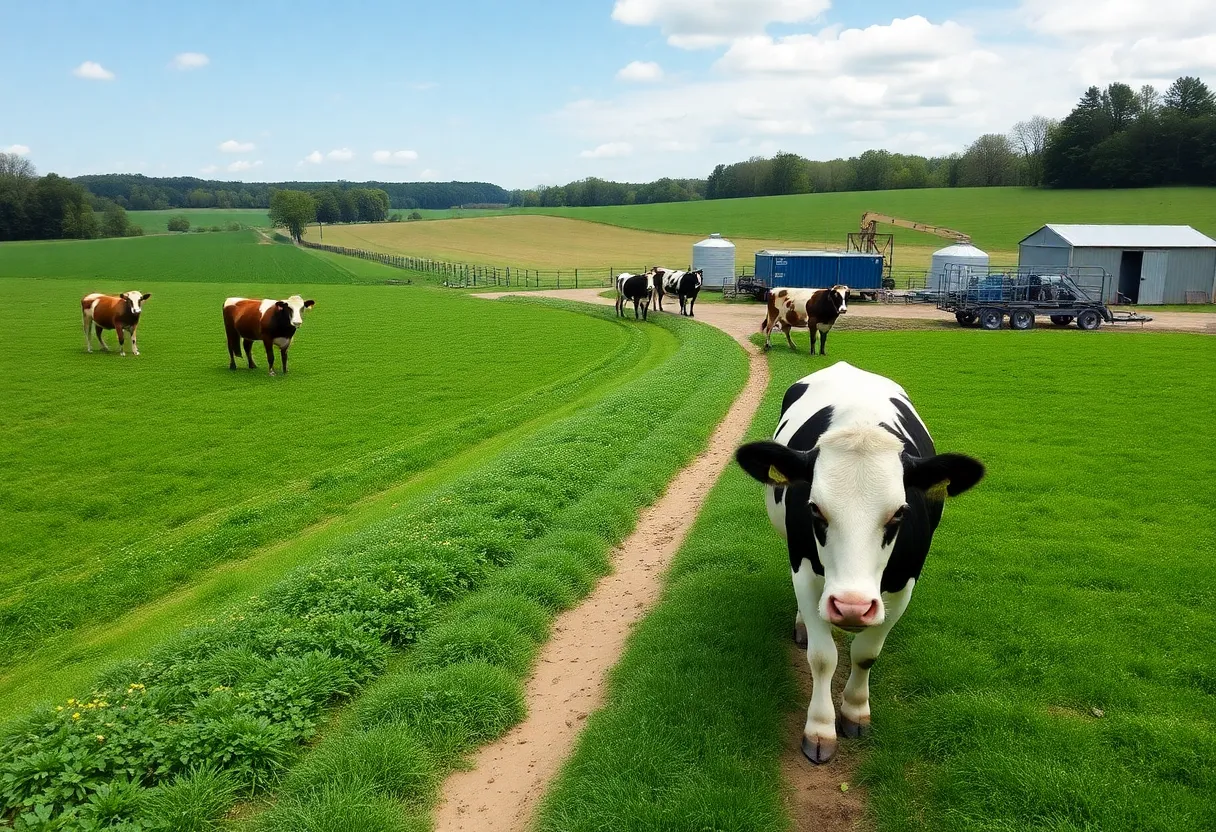News Summary
Pennsylvania dairy farmers are adapting to climate change through innovative practices that enhance sustainability while facing equipment challenges. Notable examples include the use of advanced manure spreading tools and the construction of lagoons for effective waste management. These efforts not only aim to reduce greenhouse gas emissions but also reflect a growing commitment to environmental stewardship in the dairy sector. The emphasis on sustainable practices is critical for the long-term viability of dairy farming and the health of the planet.
Pennsylvania dairy farmers are actively adapting to climate change through the implementation of innovative, climate-smart practices, while also facing equipment-related challenges. The drive to sustain their businesses is aligning with efforts to protect the environment, particularly through the reduction of greenhouse gas emissions.
One notable example is Paul Mason, who operates Mason’s Chrome View dairy in Nottingham. Recently, Mason began using the 360 Rain, a sophisticated manure spreading tool that stands over 16 feet tall. Introduced in May 2025, the 360 Rain is designed to optimize manure application on the farm while simultaneously lowering methane emissions, a potent greenhouse gas produced by livestock waste. The effectiveness of this tool in terms of emission reduction aligns with Mason’s commitment to enhancing his farm’s environmental stewardship.
In Mifflintown, Pennsylvania, another dairy farmer, Brett Reinford, is also taking substantial steps towards improving sustainability at Reinford Farms. He is in the process of constructing a lagoon capable of holding up to 8 million gallons of cow manure. This storage solution is intended to further the farm’s efforts to manage waste effectively. At Reinford Farms, cow manure is processed through a liquid-solid separator and an anaerobic digester, with the next phase involving the use of a covered lagoon to minimize methane emissions. However, Reinford is experiencing setbacks due to delays in the installation of 4,000 feet of piping required to transport the liquid manure. This delay has arisen following the cancellation of the USDA’s Partnerships for Climate-Smart Commodities program, which some farmers had relied upon for funding and resources.
The shift towards climate-smart practices among Pennsylvania dairy farmers is reflective of a broader trend within the industry. Farmers are increasingly evaluating their operations not only in terms of business viability but also regarding sustainability and environmental responsibility. Implementing these practices is seen as crucial for both the future of dairy farming and the health of the planet.
Mason’s Chrome View dairy has garnered attention beyond its sustainable practices due to one of its most distinguished residents. Chrome-View Charles 3044, a Holstein cow raised by Mason, recently achieved the U.S. lifetime milk production record, totaling an impressive 478,200 pounds. This figure is equivalent to providing daily milk servings for ten people for over 80 years, highlighting her significant contribution to the dairy industry. Currently in her tenth lactation, 3044 has consistently demonstrated high milk output and maintains robust reproductive health, breeding back effectively on either the first or second service. She holds a classification of Very Good 88, and her lineage traces back to 1958. The lifetime production total of 3044 also equates to a financial value of approximately $92,402.50, calculated based on average milk prices.
The meticulous management practices employed by the Mason family are vital in sustaining high milk production levels and ensuring the overall health of their cows. As Pennsylvania dairy farmers like Mason and Reinford invest in modern practices and equipment, they exemplify a commitment to not only achieving economic sustainability but also to fostering environmental stewardship within the agricultural sector.
Deeper Dive: News & Info About This Topic
- Lancaster Farming: Measuring Greenhouse Gases
- Encyclopedia Britannica: Climate Change
- Dairy Herd: Record Lifetime Milk Production
- Google Search: Dairy Farming Sustainability
- Lancaster Farming: Dairy Production Experimentation
- Google Scholar: Dairy Farming Climate Change

Author: STAFF HERE PHILADELPHIA WRITER
The PHILADELPHIA STAFF WRITER represents the experienced team at HEREPhiladelphia.com, your go-to source for actionable local news and information in Philadelphia, Philadelphia County, and beyond. Specializing in "news you can use," we cover essential topics like product reviews for personal and business needs, local business directories, politics, real estate trends, neighborhood insights, and state news affecting the area—with deep expertise drawn from years of dedicated reporting and strong community input, including local press releases and business updates. We deliver top reporting on high-value events such as Mummers Parade, Philadelphia Flower Show, and Thanksgiving Day Parade. Our coverage extends to key organizations like the Greater Philadelphia Chamber of Commerce and United Way of Greater Philadelphia, plus leading businesses in telecommunications, food services, and healthcare that power the local economy such as Comcast, Aramark, and Children's Hospital of Philadelphia. As part of the broader HERE network, we provide comprehensive, credible insights into Pennsylvania's dynamic landscape.





